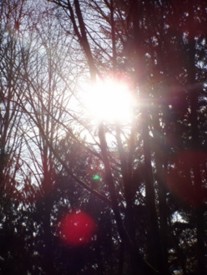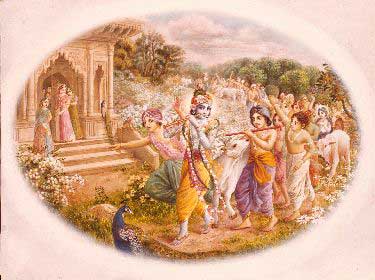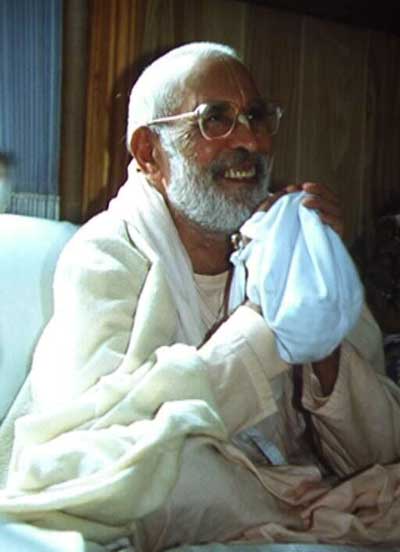Sri Srimad Bhaktivedanta Narayana Gosvami Maharaja
Experiencing a Higher Taste
(A Darsana)
June, 1992: Vrndavana, India
Published July 31, 2008
[Question:] Since we spirit souls haven't fallen from Krsna's pastimes in Goloka Vrndavana, why do the scriptures say we ‘revive' our relationship with Krsna, or that we have ‘forgotten' that relationship? Since we have never experienced it, what is the question of ‘reviving' or ‘forgetting' it? *[See endnote 1]
[Srila Narayana Gosvami Maharaja:] We can understand by the following verse:
krsna bhuli' sei jiva anadi-bahirmukha
ataeva maya tare deya samsara-duhkha
(Sri Caitanya-caritamrta, Madhya-lila 20.117)
["Forgetting Krsna, the living entity has been attracted by the external feature from time immemorial. Therefore the illusory energy maya gives him all kinds of misery in his material existence."]
The answer has been given in the word anadi. Anadi means ‘no adi', or ‘no beginning'. The conditioned jiva has never met Krsna.
[Question:] Why is the word ‘forgotten' used so often?
[Srila Narayana Gosvami Maharaja:] There is no other word. This word and other words like it have been used for beginners, for those who have no understanding of spiritual consciousness (paramartha).
 Someone may say, "The sun is shining on the branches of this tree." Why has this been said? If the sun was actually on the branch, the tree would turn to ashes in less than a moment.
Someone may say, "The sun is shining on the branches of this tree." Why has this been said? If the sun was actually on the branch, the tree would turn to ashes in less than a moment.
It is the same situation for verses that use words like ‘forget' and ‘revive'. It is certain that if one is able to see Krsna, he will never fall in the trap of maya. It would not be possible for him to fall. If a true sadhaka does not fall in the trap of maya, then what to speak of a siddha - a perfect, liberated soul who is always tasting Sri Krsna's personal service? *[See endnote 2]
There is no illusory maya in Goloka Vrndavana. If a jiva is there, where there is no illusory maya, how will that jiva forget Krsna? Bhagavad-gita states:
visaya vinivartante
niraharasya dehinah
rasa-varjam raso 'py asya
param drstva nivartate
(Bhagavad-gita 2.59)
["The embodied soul may be artificially restricted from sense enjoyment by withdrawing the senses from their objects, but his taste for sense objects remains. However, one who experiences a higher taste is fixed in consciousness. A devotee of the Lord automatically refrains because of superior taste."]
If one sees a beautiful object, but then he sees something he considers more beautiful, he will be attracted to that more beautiful thing. If there is a taste for certain objects, but then a higher taste comes, that lower taste will automatically disappear. Pure Gaudiya Vaisnavas, those who follow in the footsteps of Sri Caitanya Mahaprabhu, have that higher taste. Therefore they do not require to labor in order to control the mind - not even slightly. Rather, they easily control it by always engaging it in hearing hari-katha, chanting, and remembering Sri Krsna.
Rasa-varjam raso 'py asya, param drstva nivartate. That spiritual rasa (the mellow taste in one's relationship with Krsna) is more tasteful than this worldly rasa (the taste in any mundane relationship). The material mind is made of matter, so it always engages in worldly rasa. However, if it experiences a more beautiful taste - Sri Krsna - then it will have no time to come here to this world.
Thus, even without the devotee's conscious desire to control the mind, it will be automatically controlled by giving it more interesting objects and topics of thought. The material world is somewhat beautiful, but Lord Krsna and the gopis are more beautiful, and Goloka Vrndavana is also more beautiful.
In this world there are so many rasas, but they are like poison. At the time of tasting them, they seem sweet, but the fruit is the opposite. When men and women mix together, their relationship seems sweet at the beginning but then it turns sour. A mango is very tasteful, but if I eat more than I can digest, that mango will act like poison. I like ghee, but if I take more ghee than I can digest, it acts like poison. Everything in this world is like this.
So if one can engage his mind always, in all ways, in Krsna, that mind will automatically be controlled.
[*ENDNOTE 1:
Devotee (1): ...if we've never been with Krsna, if we've never been in Krsnaloka, then how is it that we start remembering His pastimes and His form?
Prabhupada: You remember Krsna's pastimes by hearing Srimad-Bhagavatam. You can hear Krsna's pastimes. That you can remember.
Devotee (1): But how can we remember if we've never known them before?
Prabhupada: How you can remember?
Devotee (1): If we haven't known it.
Prabhupada: You can know it by hearing from Srimad-Bhagavatam. Why we are citing so many scriptures, Srimad-Bhagavatam, Bhagavad-gita? Just to remember.]
[*ENDNOTE 2:
Carrying Srila Prabhupada's Legacy
[Srila Narayana Maharaja often requests his audiences to take help from Srila Bhaktivedanta Swami Prabhupada in order to understand the complex and vital subject of jiva-tattva, and in order to increase their faith in Sri Krsna's abode. Therefore, this chapter is full with quotes from Srila Prabhupada's translations and purports, as well as his lectures and letters. When relevant quotes are included from acaryas other than Srila Prabhupada, we have indicated them as such.]
From the Junction
[These quotes explain that it is from the tatastha-sakti that jivas turn towards the spiritual world or the material world.]
The Supreme Personality of Godhead has three primary energies, or potencies. The first is called antaranga-sakti, or the internal potency. The second is called tatastha-sakti, or the marginal potency. The third is called bahiranga-sakti, or the external potency. The living entities constitute the marginal potency, and they are situated between the internal and external potencies.
(Nectar of Instruction, text 2 purport)
It is the misfortune of the living entity, certainly not without reason, that the influence of the material energy acts on his pure consciousness and eternal bliss. This covering up of pure consciousness and eternal bliss is due to avidya-karma-samjna, the energy which acts on the infinitesimal living entities who misuse their minute independence. According to Visnu Purana, Bhagavad-gita and all other Vedic literatures, the living entities are generated from the tatastha energy of the Lord, and thus they are always the energy of the Lord and are not the energetic.
(Srimad-Bhagavatam 3.7.9, purport)
The tatastha-sakti jivas have two divisions. One division is engaged in devotional service to the Supreme Lord from beginningless time. The other has been averse to Him since then. These two divisions of jivas are endowed with knowledge of the Lord and the absence of Him respectively. The first have received the favor of antaranga-sakti, the internal potency, and are the Lord's associates like Garuda. The second are conditioned souls who are defeated by the external energy maya, because of their indifference to the Lord.
(Srila Jiva Gosvami's Paramatma-Sandharba 44-45)
[The following quote is from Sri Brahma-samhita, first published by Srila Prabhupada's Gurudeva, Srila Bhaktisiddhanta Sarasvati Thakura Prabhupada. In 1967 Srila Prabhupada requested it to be published by his own disciples.]
The Lord of the mundane world, Maha-Visnu (Karanodakasayi Visnu), possesses thousands of thousands of heads, eyes, and hands. He is the source of thousands of thousands of avataras in His thousands of thousands of subjective portions. He is the Creator of thousands of thousands of individual souls.
(Brahma-samhita, text 11)
The innumerable jivas, as spiritual particles emanating from the Supersoul in the form of pencil-rays of effulgence , have no relation with the mundane world when they come to know themselves to be the eternal servants of the Supreme Lord. They are then incorporated into the realm of Vaikuntha.
(Brahma-samhita, purport to text 16)
God's Mercy - The Soul's Free Will
[Prabhupada:] That potentiality is eternal. God is eternal. We are eternal. Our relationship is eternal. Everything is eternal. But because we are small, minute fragments, sometimes we fall down.
[Question:] They say, "God should have created us so that we..."
[Prabhupada:] Why should you dictate to God? God has created perfectly. He has given you independence. You fall down. It is your fault. If you misuse your independence, you fall down. Just like the government gives everyone an opportunity. Why do you become criminal and go to the jail? That is your fault.
[Question:] They say that God should have created us so that we...
[Prabhupada:] Why "Should have created"? He has already created perfectly. Because you are perfect, therefore you have got the independence to misuse. You are not a dead stone. That is perfection.
Ye yatha mam prapadyante [Bhagavad-gita 4.11]. You can go anywhere - svarga. You can go to the Vaikuntha. Yanti deva-vrata devan [Bhagavad-gita 9.25]. You can go to the higher planets. You can go to hell. When you go to hell, it is your choice. God has given you all perfection. Purnam idam purnam adah purnat purnam udacyate [Isopanisad, Invocation]. Everything is complete, perfect, and because you are perfect, you have got independence. But, misusing that independence, you are imperfect. Again, reviving your independence, you can become perfect although you are imperfect now. That is the Krsna consciousness movement...
Because they have become imperfect, therefore they are blaming God. "God is good" they forget this. That is their imperfectness. On one side, they say, "God is good." Still, they're blaming God. What is this nonsense? If He's God and God is good, how can you blame Him? God is good; in all circumstances, He's good. That is the meaning of good. Good does not mean that one time you are good and next time you are bad...
God has made everything. Just like here. It is made not to move. Stay. But we are better than this. Is it not? It cannot move. So God has made this also. But because we can move, we are better than this. And they say, "Why has God made me to commit mistake?" This rascal does not understand that that is freedom. Why don't you take the right path? God says, "This is right." Sarva-dharman parityajya mam ekam saranam vraja [Bg. 18.66]. Why don't you take it? And still, how you can say God is bad? What is the argument?
[Question:] Well, the argument is that if God is so all-powerful, why does He even let me fall?... Why doesn't He save me from my own foolishness? Why doesn't He...?
[Prabhupada:] Yes, He's saving you, but you don't carry out His order... Just like I say, "Chant sixteen rounds." If you do not do it, what can I do? That is your fault.
[Question:] If God were to force us, there'd be no love.
[Prabhupada:] No, no. Force is not good. Force is there. Force is there. The maya is another force.
(Morning Walk Dec. 6, 1973)
Our First Time Beyond
[The following quotes of Srila Prabhupada explain that we have not yet been to the Lord's spiritual abode.]
The mature devotees, who have completely executed Krsna consciousness, are immediately transferred to the universe where Krsna is appearing. In that universe the devotees get their first opportunity to associate with Krsna personally and directly.
(Krsna Book chapter 28, paragraph 6)
In further reference to your question about the form of the spirit soul of the conditioned living entity: there is a spiritual form always, but it develops fully only when the living entity goes to Vaikuntha. This form develops according to the desire of the living entity. Until this perfectional stage is reached, the form is lying dormant as the form of the tree is lying dormant in the seed.
(Letter to Rupanuga, 8 August, 1969)
"The one supreme transcendental potency or internal potency of Gokulesvara Sri Krsna has manifested His pastimes of Goloka or Gokula. By the mercy of this divine potency, the living entities, who are manifestations of the marginal potency, can also enter into even those pastimes."
The sole potency of Krsna, which is spiritual, functioning as Krsna's own proper power, has manifested His pastimes of Goloka or Gokula. By her grace, individual souls who are constituents of the marginal potency can have admission into even those pastimes. (Sri Brahma-Samhita text 6, purport)
No Maya There
[In the following quotes, Srila Prabhupada confirms that residents of the spiritual world never fall into the material world.]
The Viraja, or Causal Ocean, is the border between the spiritual world and material world. The material energy is situated on one shore of that ocean, and cannot enter onto the other shore, which is the spiritual sky.
(Sri Caitanya-caritamrta, Madhya-lila 20.269)
The eternally liberated living beings are in the Vaikuntha jagat, the spiritual world, and they never fall into the material world.
(Srimad-Bhagavatam 5.11.12, purport)
From authoritative sources it can be discerned that associates of Lord Visnu who descend from Vaikuntha do not actually fall. They come with the purpose of fulfilling the desire of the Lord, and their descent to this material world is comparable to that of the Lord. The Lord comes to this material world through the agency of His internal potency, and similarly, when a devotee or associate of the Lord descends to this material world, he does so through the action of the spiritual energy. Any pastime conducted by the Supreme Personality of Godhead is an arrangement by yogamaya, not mahamaya. Therefore it is to be understood that when Jaya and Vijaya descended to this material world, they came because there was something to be done for the Supreme Personality of Godhead. Otherwise it is a fact that no one falls from Vaikuntha...From authoritative sources it is learned that Jaya and Vijaya were sent to this material world to fulfill the Lord's desire to fight... Otherwise, as Maharaja Yudhisthira says, asraddheya ivabhati: the statement that a servant of the Lord could fall from Vaikuntha seems unbelievable.
(Srimad-Bhagavatam, 7.1.35, purport)
Sometimes it is asked how the living entity falls down from the spiritual world to the material world. Here is the answer. Unless one is elevated to the Vaikuntha planets, directly in touch with the Supreme Personality of Godhead, he is prone to fall down, either from the impersonal Brahman realization or from an ecstatic trance of meditation."
(Srimad-Bhagavatam, 3.25.29, purport)
"The conclusion is that no one falls from the spiritual world, or Vaikuntha planet, for it is the eternal abode."
(Srimad-Bhagavatam, 3.16.26, purport)
In That Perfect Abode, Vaikuntha
[The following statements reveal that unlike the tatastha region, from where the jiva can become overwhelmed by ignorance, Vaikuntha is completely free of maya.]
"Karanabdhi-pare. Just on the other side of the Causal Ocean, this material energy is situated. Virajara pare paravyome nahi gati. And this material energy has no entrance in the spiritual kingdom."
(New York December 17, 1966)
The Lord has His internal energy also, which has another creation known to be the Vaikuntha-lokas, where there is no ignorance, no passion, no illusion and no past and present.
(Srimad-Bhagavatam, 2.9.10, purport)
The inhabitants of those planets are liberated from birth, death, old age and diseases and have full knowledge of everything; they are all godly and free from all sorts of material hankerings. They have nothing to do there except to render transcendental loving service to the Supreme Lord Narayana, who is the predominating Deity of such Vaikuntha planets.
(Srimad-Bhagavatam, 2.6.18)
All the residents of Vaikuntha-loka know perfectly well that their master is Narayana, or Krsna, and that they are all His servants. They are all self-realized souls who are nitya-mukta, everlastingly liberated. Although they could conceivably declare themselves Narayana or Visnu, they never do so; they always remain Krsna conscious and serve the Lord faithfully. Such is the atmosphere of Vaikuntha-loka.
(Srimad-Bhagavatam, 6.1.34-6, purport)
[Question:] Swamiji, if all things here are a reflection of what is perfect in the spiritual world, then shouldn't hate and frustration and despair and prejudice also appear in the spiritual world?
[Prabhupada:] Yes.
[Question:] Does it?
[Prabhupada:] Yes.
[Question:] Then isn't that... aren't they bad?
[Prabhupada:] But that frustration has no disappointment. That is the beauty. Just like Lord Caitanya is manifesting that spiritual frustration: "Oh Krsna, I could not see You." He's jumping on the sea in frustration. But that frustration is the highest perfection of love. Yes, everything is there, but without inebriety. There is frustration, but not this material frustration. That spiritual frustration enriches one's eagerness of love for Krsna.
Now, see Visnu. Of course, in Vaikuntha-jagat there is no violence. But Visnu is taking the symbol of violence. Otherwise what is the meaning of this disc and club? So when He wants to be violent, He comes here as Nrsimha-murti. And, He sends some of His devotees to play violence. That is Hiranyakasipu.
Because there the devotees are so much in accord with Krsna and Visnu that there is no question of disagreement. But violence is when there is disagreement, by the atheist. Therefore, sometimes a devotee is deputed in this world to play as atheist, and Krsna comes to kill him - to teach these people that, "If you become atheist, here is disc and club for you."
But this is not possible to be displayed in Vaikuntha. Just like there is sometimes mock fight. A father is fighting in mock with a small child, and he has become defeated; but there is pleasure.
(Room conversation Apr. 11, 1969 New York)
Therefore, the conclusion is that the inhabitants of the Vaikuntha planets are all brahma-bhuta (self-realized) living entities, as distinguished from the mundane creatures, who are all compact in hankering and lamentation. When one is not in the modes of ignorance and passion, one is supposed to be situated in the mode of goodness in the material world. Goodness in the material world also at times becomes contaminated by touches of the modes of passion and ignorance. In the Vaikuntha-loka, it is unalloyed goodness only. The whole situation there is one of freedom from the illusory manifestation of the external energy.
(Srimad-Bhagavatam, 2.9.10 purport)
In That Most Perfect Abode, Vrndavana
[In the following passages Srila Prabhupada glorifies Vrndavana as the highest destination. Inasmuch as it is nondifferent from Krsna, it is as worshipable as He is. As there is no maya in Him, there is none in His abode. We can have faith in that abode.]

Srila Visvanatha Cakravarti Thakura said that the mission of Lord Caitanya is aradhyo bhagavan vrajesa-tanaya: "Krsna, the Supreme Personality of Godhead, is aradhya." Aradhya means He is worshipable. He's the only worshipable personality. Aradhyo bhagavan vrajesa-tanaya tad-dhamam vrndavanam: "And, as Lord Krsna is worshipable, similarly His place of pastimes, Vrndavana-dhama, is also worshipable."
(Lecture in New York, Nov. 26, 1966)
The holy place known as Mathura is spiritually superior to Vaikuntha, the transcendental world, because the Lord appeared there. Superior to Mathura-Puri is the transcendental forest of Vrndavana because of Krsna's rasa-lila pastimes. And superior to the forest of Vrndavana is Govardhana Hill, for it was raised by the divine hand of Sri Krsna and was the site of His various loving pastimes. And, above all, the superexcellent Sri Radha-kunda stands supreme, for it is overflooded with the ambrosial nectarean prema of the Lord of Gokula, Sri Krsna. Where, then, is that intelligent Person who is unwilling to serve this divine Radha-kunda, which is situated at the foot of Govardhana Hill?
(Nectar of Instruction, verse 9)
Glory, glory to Vrndavana forest, the place dearer to Lord Krsna than the transcendental realm of Vaikuntha. Vrndavana is the place where Lord Krsna eternally protects the surabhi cows, and where, sweetly playing the flute, He arouses the pure love of the gopis in the arena of the rasa dance.
(Srila Santana Gosvami's Sri Brhad-Bhagavatamrta, 1.1.5)
"I worship that supreme abode of Svetadvipa (Vrndavana), where the beloved heroines are a host of goddesses of fortune, and the Supreme Personality of Godhead is the only lover; where all the trees are spiritual desire trees, and the earth is made of transcendental wish-fulfilling cintamani jewels; where the water is nectar, natural speaking is melodious song, and walking to and fro is an artful dance. Where the flute is the dearmost friend, where life is full of knowledge and bliss, and the supreme spiritual substance that comprises all things is relishable. Where a vast transcendental ocean of milk is always flowing from millions upon millions of surabhi cows; and where time is not subject to passing away, even for a blinking of an eye, because it is not divided into past, present, and future, but remains in the undivided eternal present. That divine abode, which is practically unknown in the world, is known by the name of Goloka, to only a few, rare sadhus."
(Brahma Samhita, 5.56)
(Painting of Krsna and the cowherd boys by Syamarani dasi, copyright Bhaktivedanta Book Trust International, used with permission.)
Editor: Syamarani dasi









